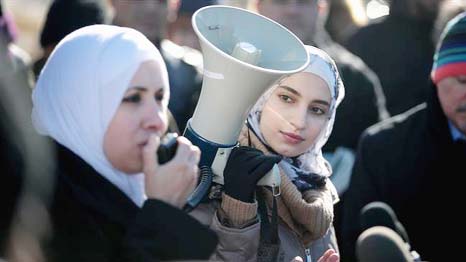
Reuters, Boston :
When the Masjid Al-Kareem mosque in Providence, Rhode Island, received a threatening letter in November calling Muslims a “vile and filthy people,” its members were frightened enough they asked for and got extra police protection.
The 42-year-old mosque was far from alone. The letter it received was one of 2,213 anti-Muslim bias incidents in the United States last year, according to a report released Tuesday by the Council on American-Islamic Relations.
The report found a 57 per cent increase in the number of incidents in 2016, up from 1,409 in 2015. Incidents increased 5 percent from 2014 to 2015.
While the group had been seeing a rise in anti-Muslim incidents prior to Donald Trump’s stunning rise in last year’s presidential primaries and November election victory, it said the acceleration in bias incidents was due in part to Trump’s focus on militant Islamist groups and anti-immigrant rhetoric. Rhode Island’s oldest mosque was only threatened, while others in Florida and Texas were set ablaze in cases ruled arson. But the knowledge of how common threats had become was far from comforting for Faissal Elansari, a member of the mosque’s board.
“Hearing about it is not the same thing as when you receive it, it was definitely a weird feeling,” Elansari said.
CAIR officials decided in September to start what they intend to be quarterly reports after noticing a pickup in complaints beginning in 2014, following the rise of Islamic State killings in the Middle East and attacks inspired by the group in Europe and the United States.
“There was this widespread sense that we were going right back to how it was after 9/11,” when al Qaeda hijackers launched coordinated attacks on New York and Washington, sparking a wave of anti-Muslim sentiment, said Corey Saylor, director of the CAIR department on monitoring and combating Islamophobia. “We wanted to be able to put something factual out there.”
The accounting includes a wide variety of bias incidents, from assaults and street harassment, to employment discrimination, to what the group considers unwarranted contact by the Federal Bureau of Investigation. It also shows a rise in anti-Muslim hate crimes to 260 in 2016, up 44 percent from 180 a year earlier. That includes all crimes recorded where CAIR saw evidence of anti-Muslim bias, not just those where hate crime charges were brought, Saylor said.
CAIR attorneys reviewed each incident reported and eliminated cases that were later disproved, including a New York City woman who alleged she had been attacked by Trump supporters shortly after his election. She was later arrested and charged with making up the encounter.
When the Masjid Al-Kareem mosque in Providence, Rhode Island, received a threatening letter in November calling Muslims a “vile and filthy people,” its members were frightened enough they asked for and got extra police protection.
The 42-year-old mosque was far from alone. The letter it received was one of 2,213 anti-Muslim bias incidents in the United States last year, according to a report released Tuesday by the Council on American-Islamic Relations.
The report found a 57 per cent increase in the number of incidents in 2016, up from 1,409 in 2015. Incidents increased 5 percent from 2014 to 2015.
While the group had been seeing a rise in anti-Muslim incidents prior to Donald Trump’s stunning rise in last year’s presidential primaries and November election victory, it said the acceleration in bias incidents was due in part to Trump’s focus on militant Islamist groups and anti-immigrant rhetoric. Rhode Island’s oldest mosque was only threatened, while others in Florida and Texas were set ablaze in cases ruled arson. But the knowledge of how common threats had become was far from comforting for Faissal Elansari, a member of the mosque’s board.
“Hearing about it is not the same thing as when you receive it, it was definitely a weird feeling,” Elansari said.
CAIR officials decided in September to start what they intend to be quarterly reports after noticing a pickup in complaints beginning in 2014, following the rise of Islamic State killings in the Middle East and attacks inspired by the group in Europe and the United States.
“There was this widespread sense that we were going right back to how it was after 9/11,” when al Qaeda hijackers launched coordinated attacks on New York and Washington, sparking a wave of anti-Muslim sentiment, said Corey Saylor, director of the CAIR department on monitoring and combating Islamophobia. “We wanted to be able to put something factual out there.”
The accounting includes a wide variety of bias incidents, from assaults and street harassment, to employment discrimination, to what the group considers unwarranted contact by the Federal Bureau of Investigation. It also shows a rise in anti-Muslim hate crimes to 260 in 2016, up 44 percent from 180 a year earlier. That includes all crimes recorded where CAIR saw evidence of anti-Muslim bias, not just those where hate crime charges were brought, Saylor said.
CAIR attorneys reviewed each incident reported and eliminated cases that were later disproved, including a New York City woman who alleged she had been attacked by Trump supporters shortly after his election. She was later arrested and charged with making up the encounter.

